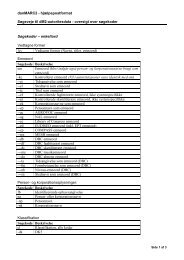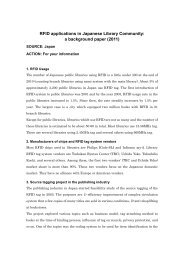RFID Data Model for Libraries - biblstandard
RFID Data Model for Libraries - biblstandard
RFID Data Model for Libraries - biblstandard
Create successful ePaper yourself
Turn your PDF publications into a flip-book with our unique Google optimized e-Paper software.
<strong>RFID</strong> <strong>Data</strong> model <strong>for</strong> libraries Doc 067<br />
Annex C<br />
From the American Library Association<br />
RESOLUTION ON<br />
RADIO FREQUENCY IDENTIFICATION (<strong>RFID</strong>) TECHNOLOGY<br />
AND PRIVACY PRINCIPLES<br />
WHEREAS, Radio Frequency Identification (<strong>RFID</strong>) is a technology that uses various<br />
electronic devices, such as microchip tags, tag readers, computer servers, and software, to<br />
automate library transactions; and<br />
WHEREAS, the use of <strong>RFID</strong> technology promises to improve library operations by<br />
increasing the efficiency of library transactions, reducing workplace injuries, and improving<br />
services to library users; and<br />
WHEREAS, many libraries are adopting or in the process of adopting <strong>RFID</strong> technology to<br />
automate library circulation, inventory management, and security control; and<br />
WHEREAS, consumers, consumer groups, librarians, and library users have raised concerns<br />
about the misuse of <strong>RFID</strong> technology to collect in<strong>for</strong>mation on library users' reading habits<br />
and other activities without their consent or knowledge; and<br />
WHEREAS, protecting user privacy and confidentiality has long been an integral part of the<br />
mission of libraries; and<br />
WHEREAS, the ALA Code of Ethics states, “We protect each library user's right to privacy<br />
and confidentiality with respect to in<strong>for</strong>mation sought or received and resources consulted,<br />
borrowed, acquired or transmitted”; and<br />
WHEREAS, Privacy: An Interpretation of the Library Bill of Rights states that "The<br />
American Library Association affirms that rights of privacy are necessary <strong>for</strong> intellectual<br />
freedom and are fundamental to the ethics and practice of librarianship," and calls upon<br />
librarians "to maintain an environment respectful and protective of the privacy of all users";<br />
and<br />
WHEREAS, the ALA Intellectual Freedom Committee recognizes the importance of<br />
developing policies and guidelines <strong>for</strong> appropriate implementation of <strong>RFID</strong> technology in<br />
light of the profession's commitment to preserving user privacy and its concern <strong>for</strong> preserving<br />
the trust of library users; and<br />
WHEREAS, the ALA Intellectual Freedom Committee and the ALA Office <strong>for</strong> In<strong>for</strong>mation<br />
Technology Policy, recognizing the immediate need to draft privacy principles to protect and<br />
promote ALA’s values, joined with the Book Industry Study Group (BISG) to <strong>for</strong>m a working<br />
group dedicated to developing a set of privacy principles to govern the use of <strong>RFID</strong><br />
technology by all organizations and industries related to the creation, publication, distribution,<br />
and retail sale of books and their use in libraries; now, there<strong>for</strong>e, let it be<br />
RESOLVED, that the American Library Association endorse the “BISG Policy Statement<br />
Policy #002: <strong>RFID</strong> — Radio Frequency Identification Privacy Principles” (Exhibit I)<br />
49




